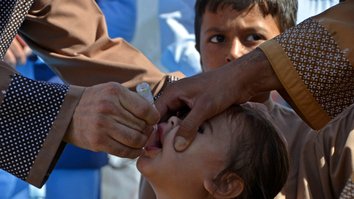KANDAHAR -- Two-year-old Farid should have been vaccinated against polio, but his family -- like many in rural Afghanistan -- believed the conspiracy theories and refused to have him inoculated.
He contracted the virus and now faces a crippling life sentence battling a potentially fatal disease with no cure.
"When the doctors told me he had polio, I felt remorse. I had believed people who told me the polio vaccine was a plot against Muslims," Abdul Wali, the child's uncle and head of the family, told AFP of his decision to rule against inoculation.
In the past decade, the numbers of Afghans infected with polio declined from a high of 80 in 2011 to 13 in 2016. Last year, though, saw a jump in new cases with 21 reported across the country.
![An Afghan health worker on March 20 administers polio vaccine to a child held by a man in Arghandab District, Kandahar Province. [JAVED TANVEER/AFP]](/cnmi_st/images/2019/06/20/18543-000_1he0a3-585_329.jpg)
An Afghan health worker on March 20 administers polio vaccine to a child held by a man in Arghandab District, Kandahar Province. [JAVED TANVEER/AFP]
![An Afghan health worker on March 20 administers polio vaccine to a child in Arghandab District, Kandahar Province. [JAVED TANVEER/AFP]](/cnmi_st/images/2019/06/20/18544-000_1he09z-585_329.jpg)
An Afghan health worker on March 20 administers polio vaccine to a child in Arghandab District, Kandahar Province. [JAVED TANVEER/AFP]
![Afghan women from a polio immunisation team on March 20 write on the wall of a house where residents are absent to ensure they will be vaccinated later, in Arghandab District, Kandahar Province. [JAVED TANVEER/AFP]](/cnmi_st/images/2019/06/20/18545-000_1he0a0-585_329.jpg)
Afghan women from a polio immunisation team on March 20 write on the wall of a house where residents are absent to ensure they will be vaccinated later, in Arghandab District, Kandahar Province. [JAVED TANVEER/AFP]
Polio immunisation is compulsory in Afghanistan, but distrust of vaccines is rife, and the programmes are difficult to enforce, particularly in rural regions.
The Taliban, having previously restricted access to such programmes for residents living in areas it controls, says it completely refuses to allow residents of those areas to obtain inoculations.
Militants and religious leaders tell the community that vaccines are a Western conspiracy aiming at sterilising Muslim children or that such programmes are an elaborate cover for Western or Afghan government spies.
Fears run so deep that some parents force their children to vomit after they receive the compulsory polio drops in government-run health centres.
"We see this a lot," said Aziza Watanwal, a doctor in Kandahar city. "They believe the propaganda."
Yar Mohammad, who brought his three-year-old daughter Razia to a local clinic in Kandahar Province, said the local mullah told villagers the polio vaccine weakens one's faith.
The child contracted the disease.
"Now she is paralysed," Mohammad said, as he looked at his daughter lying on a bed.
Taliban fear 'spies,' ban vaccination
In the border region between Afghanistan and Pakistan, home largely to conservative tribal communities, claims that the polio vaccine contains impurities -- including blood from pigs -- are widely shared.
"I have heard from elders and scholars here and in Pakistan that the polio vaccine is impure and that those who receive it will grow up with a weak faith in Allah," Kandahar city resident Abdul Wasay Rahimi told AFP.
All seven of Afghanistan's polio cases so far this year have been in Taliban-controlled areas across the south, according to health officials.
The Taliban last year barred house-to-house vaccinations, forcing health workers to use mosques as vaccination centres, said Hedayatullah Stanikzai, a senior adviser to the Afghan health minister.
Health specialists view the door-to-door vaccination campaign as the best way to eradicate polio.
But the tactic has fallen under a cloud of suspicion.
The Health Ministry tells residents the vaccination workers "are helping the vulnerable children. They are not spies," Stanikzai said.
Taliban spokesman Zabiullah Mujahid said his organisation believed polio vaccination workers use the programmes as a ruse to gather intelligence in areas under insurgent control.
"We banned the vaccinations, and until we are assured that such incidents do not recur, we cannot allow them back," Mujahid insisted.
Millions of children at risk
The anti-vaccination phenomenon has spiralled worldwide as adherents peddle baseless claims that are amplified through social media, resulting in a resurgence of highly contagious diseases.
Aside from Afghanistan, polio is endemic in two other countries -- Pakistan and Nigeria -- although medics detected a relatively rare strain in Papua New Guinea last year.
More than 1 million Afghan children were deprived of polio vaccinations in 2018, said Stanikzai, who also oversees the Health Ministry campaign for polio eradication.
If the Taliban continue their intransigence on vaccines, more than 2 million children will miss the vaccination, he said.
"Conspiracy theories can in particular flourish where lives are strictly controlled by hardline militants," said sociologist and medical analyst Waheed Majroh.
"So, when these militants tell the public that vaccines are bad, it would be hard to convince them it is good," he said.
Raising public awareness among vulnerable communities is key to debunking myths, says the Health Ministry.
The Afghan polio eradication public awareness programme is distributing information from prominent religious scholars who say vaccines are beneficial and "halal" under Islam, said Mir Jan Rasekh, a spokesman for the programme.
Each year his agency sets the goal of eradicating polio in Afghanistan.
"While it is quite possible, it feels frustrating to see at the end of the year that it didn't happen because armed men think we are spies and because locals think vaccines are contaminated," Rasekh said.







